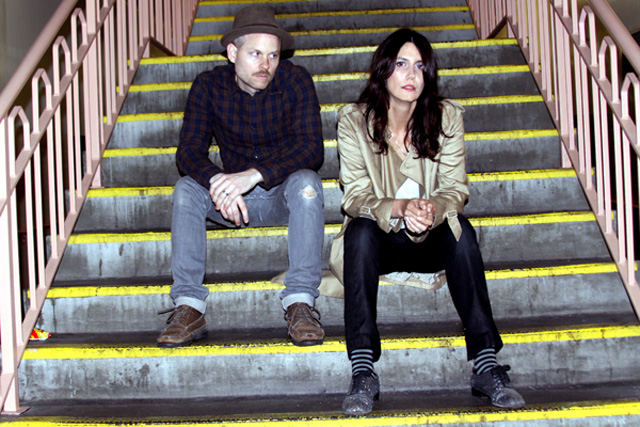
Introducing… Rainbow Arabia
Averse to any easy classification, Rainbow Arabia's continent-trekking, kaleidoscope pop is rooted in no particular time or place, employing modern technological processes to an array of musical cultures and eras. The Portland Mercury summed it up well saying “Spin a globe, extend your finger, and let it fall where it may. Chances are unless your digit landed in the ocean, your finger will rest on a swath of land that influences Rainbow Arabia.”
Inspired by the purchase of a Lebanese Casio that played microtonal scales and Eastern beats, Rainbow Arabia quickly recorded their propulsive first EP, The Basta, demonstrating much promise by synthesizing bossa nova and industrial post-punk with heavy Middle Eastern vibes. The EP was met with immediate praise and they released the “Omar K” seven-inch on Merok Records shortly after. Digg ing deeper for inspiration from the worldly found sounds of Sublime Freuencies compilations, the Los Angeles-based duo's follow-up EP, Kabukimono, expanded the color palette of their “fourth world” pop with dark, Arabic disco/dancehall jams sitting alongside sunnier moments with Caribbean and African flourishes.
Rather than restricting themselves to the expanse and musical artifacts of this planet alone, Danny and Tiffany Preston recalibrate their focus aiming their sights upwards into outer space. Nearly a year in the making, Rainbow Arabia's forthcoming first full-length Boys And Diamonds (coming out on the illustrious electronic label Kompakt) is a stunning journey that not only marries East with West but also the past with the future. Immediately, you can hear some familiar elements found in their previous releases: Danny's asymmetrical tribal beats and lysergic pads, Tiffany's labyrinthine fretwork and tick-tock vocal swagger. But you'll also notice: the hooks are stickier and more confident, the rhythms are sturdier, and the production is lusher, even astral, giving the songs more space to breathe.
Boys And Diamonds (out March 1st in the US, February 28th in UK/Europe) is unmistakably a pop album but also one that comfortably fits in with Kompakt's long-standing lineage of genre-refracting releases. You will be hard up find another record that cohesively brings to mind Siouxsie rubbing elbows with Shabba Ranks, Giorgio Moroder sipping daiquiris in Bali, Desmond Dekker envisioned through skittering footwork, Phil Collins sitting in with Congotronics, even early Madonna produced by Chris and Cosey. Unlikely as all of that sounds, Rainbow Arabia makes it sound easy.
Inspired by the purchase of a Lebanese synthesizer playing microtonal scales and lo-fi Eastern drum patterns, Rainbow Arabia began a escapist diversion from Danny and Tiffany Preston's day jobs. The demos they recorded, which were written and put to tape in a matter of a days, became their debut, The Basta. Barely existing for only a few months, the married couple were picked out of the ether by NYC sonic alchemists/kindred spirits Gang Gang Dance to support them on a cross-continental tour in 2008. Once they got back (and to their surprise) they quickly found themselves a legitimate act with acclaim from PITCHFORK, THE FADER, XLR8R, NME, in addition to a word-of-mouth groundswell for their fresh, contemporary East meets West take on the Sublime Frequencies catalog that inspired them so much in the first place.
With a penchant for global pop and psychedelic tribal beats, Rainbow Arabia caught ears across the pond releasing the “Omar K” seven-inch on UK's Merok Records (Crystal Castles, Teengirl Fantasy) leading to their first European tour in 2009. Shortly after they released their follow-up digging deeper for inspiration from worldly found sounds, the Los Angeles-based duo's follow-up EP, Kabukimono, expanded the color palette of their Middle Eastern-tinged “fourth world” pop with darker industrial dancehall and comfortably sitting alongside brighter Caribbean and African flavors.
Not interested in merely musical/cultural tourism, the Prestons shifted their focus outward in writing their first full-length album Boys And Diamonds. The inspiration that they found landed squarely in between future-thinking contemporary club music (techno, hip-hop, dubstep) and the organic globe-trekking dance music of the last century (reggae, ragas, gamelan) they've been known to draw from. Add in an affection for the 80s synth-pop they grew up on and the gothic influences informing Tiffany's teenage years specifically (Love and Rockets, OMD, Christian Death), and you have an interesting recipe that is utterly unclassifiable as it is repeatedly listenable.
